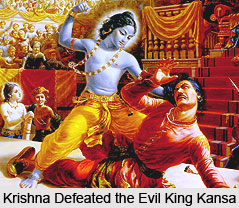 The episode of death of Kansa, the king of Magadha, marks the victory of good over evil. Lord Krishna visited Mathura with Balarama in the company of Akrura who had been sent to Vraja by Kansa because Kansa wanted to kill both Keshava and Balarama. The king had planned that he would kill both his enemies by inviting them in a trial of strength. The two powerful demons of Kansa were Chanura and Mushtika with whom Krishna and Balarama were to fight.
The episode of death of Kansa, the king of Magadha, marks the victory of good over evil. Lord Krishna visited Mathura with Balarama in the company of Akrura who had been sent to Vraja by Kansa because Kansa wanted to kill both Keshava and Balarama. The king had planned that he would kill both his enemies by inviting them in a trial of strength. The two powerful demons of Kansa were Chanura and Mushtika with whom Krishna and Balarama were to fight.
The legend states that the highly powerful Lord Krishna was engaged in combat with Chanura. The demon Mushtika who was well-versed in wrestling started fighting with Balarama. Mutually entwining and pushing and falling and beating each other with fist`s, arms and elbows and pressing each other with their faces, inter-facing their arms, kicking with-their feet, pressing with their whole weight upon another, fought Hari and Chanura. And at the time of this national festival Lord Krishna and Chanura had a dreadful encounter. Chanura was gradually losing his original vigour and the wreath. Upon his head trembled the world-comprehending Krishna. Seeing Chanura losing and Krishna, gaining strength Kansa, worked up with ire and had ordered the music to cease. And as soon as music was stopped by Kansa countless celestial bugles were sounded in the welkin.
Thereupon sporting for a long time with Chanura, Krishna, and the slayer of Madhu, at last lifted him up and whirled him with the intention of slaying him. Having whirled Chanura round a hundred times until his breath had expended in the sky, the lord dashed the body of Chanura on the ground. As soon as it felt it was sundered into a hundred pieces and the earth was strewn with a hundred pools of gory mire. While this happened, the powerful Baladeva was engaged with the demon Mushtik. Striking him on the head with his fists and on the breast with his knees, he stretched firm on the ground, and pummelled him there till he was dead Again, Krishna encountered the royal bruiser Tomalaka, and felled him to the earth with a blow of his left hand.
Seeing such an incident in front of his eyes Kansa ordered that Krishna should be seized and chained and the two cow boys should be driven away from the kingdom. Kansa had also ordered that all the cattle of the cowherds of Gokula should be taken away from them. Upon hearing these orders, Madhava laughed at Kansa, and springing up to the place where he was seated, took hold of him by the hair of his head, and struck him to the ground. Then casting Kansa down upon the earth, Krishna threw himself upon him. Crushed by the weight of the upholder of the universe, Kansa gave up. Krishna then threw the dead body, by the hair of the head, into the centre of the arena.
Witnessing Kansa is that condition, his brother Sumalin came to his succour; but he was encountered, and easily killed, by Balabhadra. As soon as Kansa died a jubilation began in Mathura because the lord of the universe had been successful in slaying the mighty evil king Kansa without much difficulty.




















